- Home
- Daphne Du Maurier
The Scapegoat Page 8
The Scapegoat Read online
Page 8
'Go back,' I called softly. 'Go back into the room.' The figure did not move. Another chestnut hit me on the head. 'Go back,' I called again. 'Go back, or you will fall.'
Then the child spoke, the voice coming clear and high and quite composed.
'I swear to you,' it said, 'that if you don't come to me by the time I count a hundred, I shall throw myself out of the window.'
I did nothing, and the voice called down to me again.
'You know I never break my word. I'm beginning to count now. And unless you are with me by the time I reach a hundred, I swear by the Sainte Vierge that I will do it. One ... two ... three ...'
A recollection of fever, saints, and visions came crowding back into my mind. The conversation of the evening made sense to me at last. It had never occurred to me that the religious, saintly Marie-Noel might be a child. The voice continued counting, and I turned and went through the garden door to the terrace, and so to the front door, which had not been bolted. I groped my way up the stairs to the first corridor, blindly seeking for some second service stairway that might lead me direct to the turret above the dressing-room. I found a swing-door and kicked it open, for it no longer mattered that I might be heard and the household aroused: my only thought was to prevent disaster.
I came to a winding stair, lit by a dim blue bulb, and ran up it, two steps at a time. The steps led to a landing and another winding corridor, but directly in front of me was a door, and from behind the door I could hear the voice counting steadily, 'Eighty-five, eighty-six, eighty-seven ...' I burst through the door, and seized the figure from the window-sill, and threw it down on its bed beside the wall. It stared up at me with enormous eyes and close-cropped hair, and I felt sick because it was a replica of Jean de Gue, and therefore in fantastic fashion of a self long buried in the past and so forgotten.
'Why did you not come to say good night, Papa?' she said to me.
6
She gave me no time to think what I should answer. She jumped from her bed and threw herself upon me, flinging her arms round my neck, covering me with kisses.
'Get off, stop it,' I said, trying to disentangle myself.
She began to laugh, clinging the harder, like a monkey, then suddenly turned and somersaulted back on to the bed. When she had recovered balance she sat cross-legged at the end of it, tailor-fashion, watching me without a smile. I recovered my breath and smoothed my hair, and we stared at one another like two animals before battle.
'Well?' she said - the inevitable 'Alors?' that is question and exclamation and retort all in one - and I repeated it, to gain time, to try and grasp the significance of this new and unexpected complication of a daughter, and then, endeavouring to hold my ground, I said, 'I thought you were supposed to have a fever?'
'I did this morning,' she said, 'but when my aunt Blanche looked at the thermometer this evening I was only just above normal. Since I stood by the window it has probably shot up again. Sit down.' She patted the bed beside her. 'Why didn't you come to see me the instant you got back?' she asked.
Her manner was imperious, as if she was accustomed to giving orders. I did not answer.
'Joker,' she said lightly. Then she put out her hand and seized my own and kissed it. 'Have you had your nails manicured?' she asked.
'No.'
'They are a different shape, and your hands are cleaner. I suppose that is what Paris does for men. Also you have a different smell.'
'What sort of smell?'
She wrinkled her nose. 'Like a doctor,' she said, 'or a priest, or a stranger who comes to tea.'
'I'm sorry.' I stared at her, nonplussed.
'It will pass off. It is evident you have been moving in exalted circles. Have you all been discussing me below?'
Some instinct told me children should be snubbed. 'No,' I said.
'That's not true. Germaine told me they talked of nothing else at lunch. Though there was also much fussation because you were late. What were you doing?'
I decided to speak the truth as far as possible. 'I was sleeping in a hotel in Le Mans,' I said to her.
'What a funny idea. Were you very tired?'
'I had drunk too much the night before, and hit my head on the floor. Also I believe I swallowed a sleeping-draught by mistake.'
'If you hadn't taken the sleeping-draught, would you have gone away?'
'What do you mean?' I asked.
'Would you have gone off somewhere and not come back?'
'I don't understand you.'
'The Sainte Vierge told me that you mightn't come back. That's why I got a fever.' She was no longer imperious. She was watching me closely, her eyes not moving from my face. 'Have you forgotten,' she said, 'what you told me before you went to Paris?'
'What did I tell you?'
'That one of these days, if life became too difficult, you would just disappear and never come home again.'
'I'd forgotten I said that.'
'I hadn't forgotten. When uncle Paul and the rest of them began talking about the money troubles, and how you had gone to Paris to try and arrange things, and he had not much hope of your success, I thought to myself, "Now is the moment for him to do this." I woke in the night and was sick, and the Sainte Vierge came and stood at the end of my bed and looked sorrowful.'
The direct gaze of the child was hard to meet. I shifted my eyes, and, taking up a well-worn rabbit lying beside her, played with the single ear.
'If I hadn't come back,' I asked, 'what would you have done?'
'Killed myself,' she said.
I set the rabbit to dancing on the sheet. I had a hazy recollection that this had made me laugh years past, in the days when I had toys. The child did not laugh. She took the rabbit from me and put it behind the bolster.
'Children don't kill themselves,' I told her.
'Then why did you run upstairs so fast just now?'
'You might have slipped.'
'I couldn't have slipped. I was holding on. I often stand at the window. But if you hadn't come home, then it would have been another matter. I shouldn't have held on. I should have jumped out, and died. And then I should have burnt in hell. But I would rather burn in hell than live in this world without you.'
I looked at her again: the small oval face, the close-cropped hair, the burning eyes. The passionate avowal was disturbing, shocking, something to be expected from a fanatic, not a child. I thought hard to find the right thing to say.
'How old are you?' I asked.
'You know quite well I shall be eleven next birthday,' she said.
'Very well, then. You have the whole of life before you. You have your mother, aunts, grandmother, all the people here at home who love you, and yet you talk wild nonsense about throwing yourself from a window if I wasn't here.'
'But I don't love them, Papa. I only love you.'
So that was that. I wanted a cigarette. Unconsciously I fumbled in my pockets, and seeing this she jumped from the bed, ran to a small desk near the window, took out a box of matches from a pigeon-hole, and in a flash was back by my side with a lighted match held ready.
'Tell me,' she said, 'is it true that measles can be bad for unborn babies?'
The switch of mood was beyond me. 'I don't know,' I said.
'Maman told me that if I catch it and pass it to her, and she passes it to the little brother, then he will be born blind.'
'I can't tell you. I don't understand those things.'
'If my little brother was blind, would you like him?'
She was not solemn any more. She began to pirouette about the room on her toes, first on one foot, then on the other. I did not know how to answer her. She kept looking at me as she danced.
'It would be very sad for a baby to be born blind,' I said uselessly.
'Would he have to be put in an institution?' she said.
'No. He would be taken care of here at home. In any case it won't happen.'
'It might. I may have measles, and if I have, I am sure to have passed them on
to Maman.'
I felt I had caught her out, and the slip was too good to miss.
'You told me just now that you had a fever because you were afraid I wouldn't come home,' I said swiftly. 'You didn't say anything about measles then.'
'My fever came because I was visited by the Sainte Vierge. It is a sign of Grace,' she answered.
She stopped pirouetting, and got into bed, and covered her face with the sheet. I dropped my cigarette ash into a doll's saucer and glanced around the room. It was an odd mixture of nursery and cell. There was a second slit in the wall as well as the window where she had stood to throw chestnuts on my head, and immediately beneath this slit she had improvised a prie-dieu, made out of a packing-case, with a piece of old brocade across the top. Above this was a crucifix, adorned with a rosary, and between two candles on the top of her prie-dieu was a statue of the Madonna. Close by, on the wall, were pictures of the Holy Family, the head of St Therese of Lisieux, and incongruously, perched lop-sided on a stool, a doll with paint-splodges over its naked stuffed body, pierced through the heart with a pen-holder. Round its neck was a card with the words 'The Martyrdom of St Sebastian'. Toys, more suited to her age than the prie-dieu, lay about the floor; and by her bed was a photograph of Jean de Gue in uniform, taken, judging by the youthful appearance, before she was born.
I stubbed out my cigarette and got up. The figure under the blanket did not move.
'Marie-Noel, promise something.'
Still no movement. I supposed she was foxing sleep. It did not matter.
'Promise you won't climb on the window-sill again,' I said.
Nothing happened, and then there was an odd scratching sound, which began faintly, stopped, and continued more loudly. I realized that she was scratching the wall beside her bed in imitation of a mouse or rat. This was followed by a squeak, then a kick under the blanket. Forgotten sayings of disapproving adults returned to me.
'You're being neither clever nor funny,' I said. 'If you don't answer me at once I shan't say good night.' A louder rat squeak and more violent scratching on the wall was the reply. 'Very well then,' I said firmly, and opened the door. What I intended by this gesture heaven knew, for she held all the cards; she had only to go to the window again to prove it.
The threat, to my relief, succeeded. She threw down the sheet, sat up in bed and held out her arms. Reluctantly I went to her.
'I will promise, if you will too,' she said.
Her reasoning was sound, but I sensed a trap. This was something for Jean de Gue to handle, not for me. I did not understand children.
'What must I promise?' I asked.
'Never to go away and leave me,' she said, 'or, if you must go, to take me with you.'
Once again I avoided the direct question in her eyes. The situation was impossible. I had already placated the mother, pandered to the wife. Must I surrender to the daughter too?
'Listen,' I said, 'adults can't commit themselves to promises of that kind. No one can foretell the future. There might be another war.'
'I'm not talking about war,' she said.
There was a strange, age-old wisdom in her voice. I wished she were older, or much younger, or somehow different. She was the wrong sort of age. I might have dared to tell the truth to someone growing up, but not to a child of ten, still fast in her secret world.
'Well?' she said.
No adult awaiting a decision about the future could have been more calm or grave. I wondered why Jean de Gue had ever suggested to her that he might leave home and disappear. Had it been a threat to win obedience, like my trick of a moment ago? Or was the threat deliberate, so that when it did happen she would be prepared?
'It's no use,' I said, 'I can't make that promise.'
'I didn't think you could,' she said. 'Life is hard, isn't it? We must both just hope for the best - that you will stay at home, and that I shan't have to die young.'
The casual, somehow fateful tone of voice was worse than if she had shown emotion. She kissed my hand again. I took a chance.
'Listen,' I said, 'I promise you that if I do go away, I'll tell you first. I may tell nobody else, but I will tell you.'
'That's fair,' she nodded.
'And now will you go to sleep?'
'Yes, Papa. My blankets have come unstuck. Settle me, please.'
The clothes were loose at the bottom. I thrust them in tight, so that she could not move. She watched me from the pillow. I supposed I was meant to kiss her.
'Good night,' I said, 'sleep well.' And I kissed her on the cheek.
She was thin and bony, her face and neck small and the eyes much too big.
'You're not fat enough,' I said, 'you ought to eat more.'
'Why do you look so awkward?' she asked.
'I'm not awkward.'
'You've got the face on of someone who tells a lie.'
'I continually lie.'
'I know you do. But not as a rule to me.'
'Well, that's enough for now. Good night.'
I went out and shut the door. I listened a moment outside, but there was no sound of movement, so I went down the turret stair, through the baize door, and back along the corridor to the dressing-room.
I felt suddenly very tired. The house was quite still. No one had been awakened by my rush upstairs, or by the barking of the dog outside. I crept into the bathroom and stood by the open bedroom door, listening. Francoise did not stir. I went close to the bed, and from the sound of breathing knew her to be fast asleep. I went back into the dressing-room, took off my things, and got into the bath. It had grown cold, but I didn't want to disturb her by running hot water. I dried, and put on the pyjamas I had worn at the hotel and the dressing-gown that was lying across the chair. I brushed my hair with his brushes, as I had done in the morning, and then went over to the table and picked up the parcel that bore the initials M-N. It felt like a book. Carefully I undid the string and the wrapping, and it was a book, as I had thought. The title was The Little Flower, and with it was a large, highly coloured plate of St Therese of Lisieux, bought separately and slipped inside. On the fly-leaf Jean de Gue had written, 'To my adorable Marie-Noel, with all my heart, Papa.' I wrapped the book up again, and put it back on the table with the other packages. He must have chosen his presents with great care. I did not know what it was he had brought back for his mother, but it was something that she needed badly. The locket had dried his wife's tears and helped her to go to sleep believing in him. The Little Flower, when it lay open, as it would do, beside his picture in the turret room, would feed the imagination of his child, so that she might see visions, and dream dreams, and in doing so perhaps nag his conscience less - that is, if he had a conscience, which I doubted. I leant out of the window once again, and the chestnuts still fell from the trees on to the gravel path beyond the moat, and a mist was rising from the grass, spreading in wisps towards the murky trees.
One had no right to play about with people's lives. One should not interfere with their emotions. A word, a look, a smile, a frown, did something to another human being, waking response or aversion, and a web was woven which had no beginning and no end, spreading outward and inward too, merging, entangling, so that the struggle of one depended upon the struggle of the other.
Jean de Gue had acted wrongly. He had run away from life, he had escaped from the emotions that he had himself created. None of these people under his roof would be behaving as they had behaved tonight but for something he had done to them. The mother would not have turned to me with frightened eyes, the sister would not have left the room in silence, Paul would not have spoken with hostility, Renee would not have cursed me on the stairs, the wife would not have wept, the child would not have threatened to throw herself out of the window. Jean de Gue had failed. He was a greater failure than I. And that was why he had left me sleeping in the hotel in Le Mans and gone away. It was not a jest, but a confession of defeat. I knew now that he would not come back. He would not even bother to find out what had happened. I could
do as I pleased, leave his home or stay. If I had never met him, if none of this had happened, I should have been tonight at the guest-house in la Grande-Trappe, learning there what to do with failure. I should have heard the monks chanting their Office, said my first prayer. Now none of this was going to happen, and I was alone. Or rather I was not alone - I was part of the life of other people. Never before had I been concerned with the feelings of anybody but myself, except for the minds and motives of characters in history long since dead. Now I had a chance to do otherwise, through deception. I could not be sure if anything good ever came through a lie. I thought not - only trouble, war, disaster - but I did not know. If I had gone to la Grande-Trappe they would have told me, but instead I was in another man's home.
I turned away from the window in the dressing-room, went into the bedroom and took off my dressing-gown and slippers. Then I lay down beside his poor, pathetic wife, who was sleeping peacefully with the locket pinned on her shawl, and I said, 'Oh, God, what am I to do? Ought I to leave this place, or should I stay?'
And there was no answer, only a question mark.
7
I slept heavily, and when I awoke the shutters had been pushed back, daylight filled the room, and my partner had left my side. I could hear voices coming from the bathroom beyond, and I lay still, my hands behind my head, looking about me at the room, whose striped wallpaper seemed out of keeping with the dark woodwork and the massive furniture, which had probably never been moved in fifty years. An effort had been made to modernize the room with bright hangings and a frilly dressing-table in the alcove. The cushions on the chairs were also striped, in an endeavour to match the wallpaper, but they were out of tone, a blend of pink and puce, distressing if the eye lingered upon them long.

 Jamaica Inn
Jamaica Inn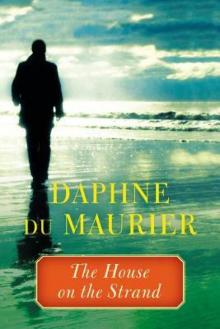 The House on the Strand
The House on the Strand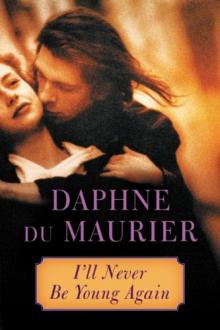 I'll Never Be Young Again
I'll Never Be Young Again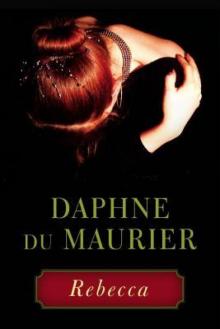 Rebecca
Rebecca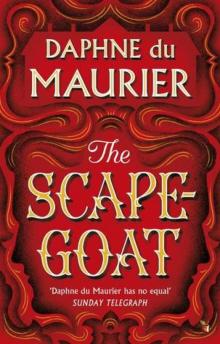 The Scapegoat
The Scapegoat The Birds and Other Stories
The Birds and Other Stories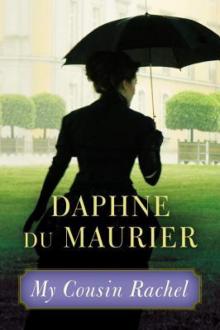 My Cousin Rachel
My Cousin Rachel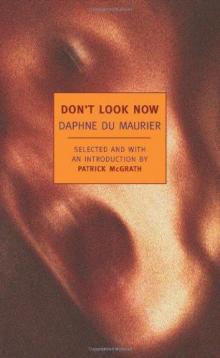 Don't Look Now
Don't Look Now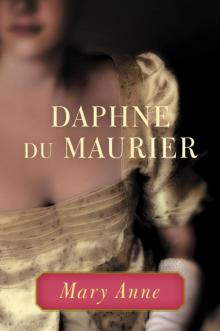 Mary Anne
Mary Anne Hungry Hill
Hungry Hill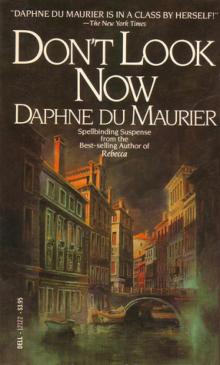 Don't Look Now and Other Stories
Don't Look Now and Other Stories The Loving Spirit
The Loving Spirit Rule Britannia
Rule Britannia The King's General
The King's General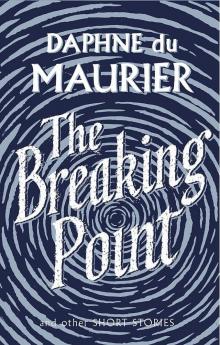 The Breaking Point: Short Stories
The Breaking Point: Short Stories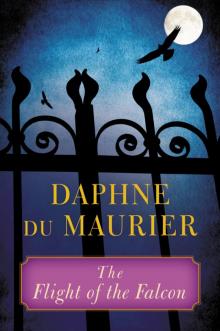 The Flight of the Falcon
The Flight of the Falcon The Apple Tree: a short novel & several long stories
The Apple Tree: a short novel & several long stories The Breaking Point
The Breaking Point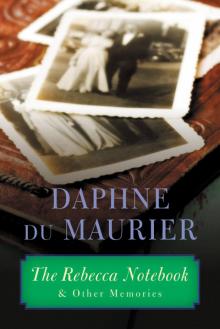 The Rebecca Notebook
The Rebecca Notebook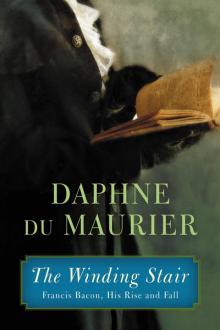 The Winding Stair: Francis Bacon, His Rise and Fall
The Winding Stair: Francis Bacon, His Rise and Fall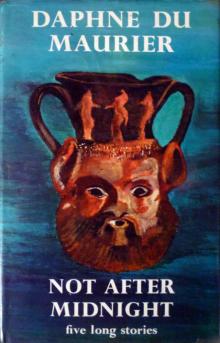 Not After Midnight & Other Stories
Not After Midnight & Other Stories The Doll
The Doll The Apple Tree
The Apple Tree